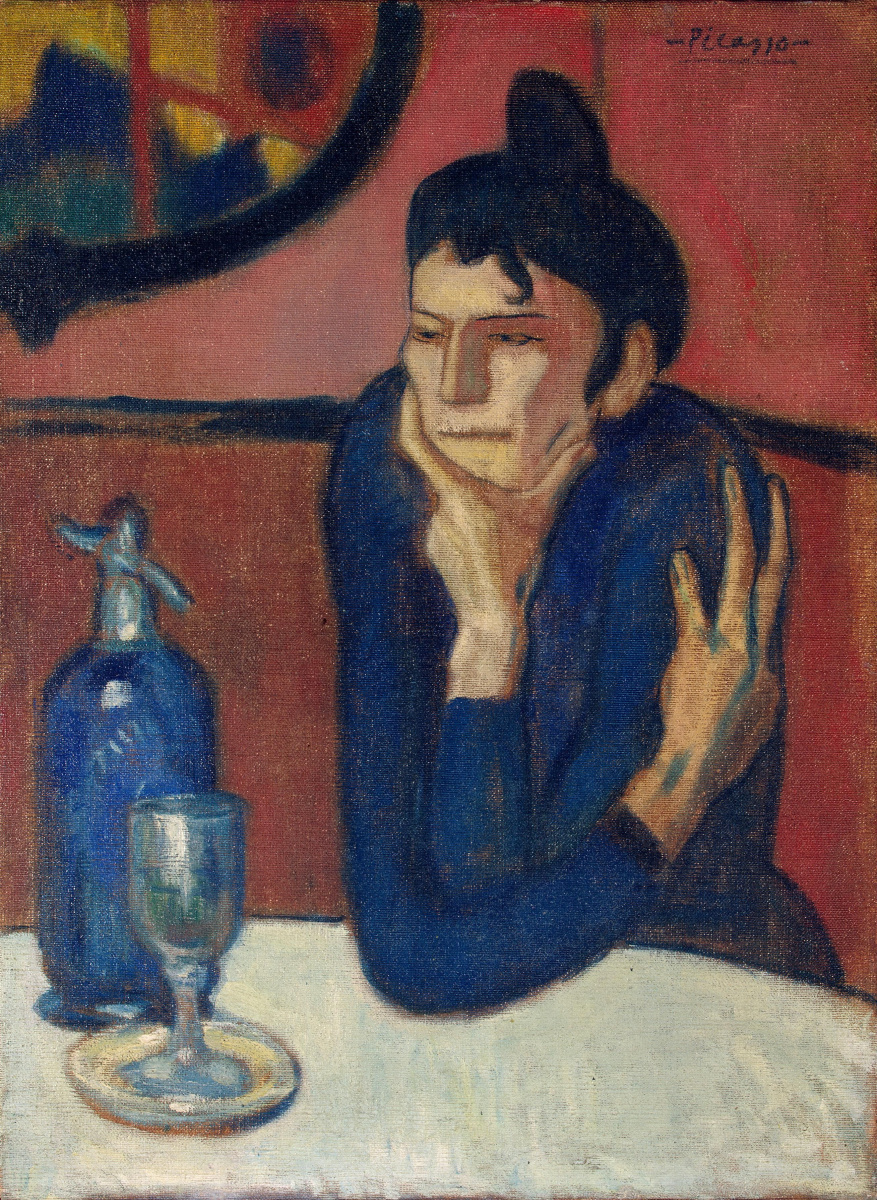log in
Enter site
Login to use Arthive functionality to the maximum
The absinthe drinker
Pablo Picasso • Pittura, 1901, 73×54 cm
Descrizione del quadro «The absinthe drinker»
Absinthe is hard to call simply an alcoholic beverage. Despite the fact that he has such a long history, such as wine, absinthe has earned the right to be called a unique phenomenon in world culture. "The green fairy" (or, according to Paul Verlaine, "the green witch") sang, among others, Arthur Rimbaud, Oscar Wilde, Ernest Hemingway, immortalized in their paintings of Edgar Degas, Edouard Manet, Henri de Toulouse-Lautrec, Vincent van Gogh and others (1, 2, 3, 4, 5). But when it comes to talking about the attitude of this drink to painting, to mind almost comes first "The absinthe drinker" Pablo Picasso.
The young Spaniard was lucky to live in Paris in a time when it was possible to fully taste all the delights of Bohemian life, including trips to brothels in the company of impoverished artists and unhindered use of absinthe. But in the French capital, Picasso will move only in 1904, but in the meantime he shuttles regularly between Paris and Barcelona, working hard, and suffering from lack of money and insecurity. "The absinthe drinker" is born precisely in this period, which at all desire can not be called happy. In 1903 Picasso will write "Portrait of angel Fernandez de Soto"whose character is depicted at a table before a glass of absinthe. In 1912, the artist will once again perpetuate a drink in a cubist work "Bottle of Pernod and glass". And finally, in 1914, a year before "the green fairy" was banned in France, Picasso creates a sculpture "Glass of absinthe". Prior to the legalization of the drink in European countries, the artist did not survive.
"The absinthe drinker" is not an original story. Lonely people in the café to Picasso and, after him, was depicted by many artists. However, it was performed by the Spanish artist, this trivial scene takes on the imprint of great drama. In the paintings "blue period"Picasso repeatedly to depict people, like the heroine of this painting ("Two acrobats (harlequin and his girlfriend)", 1901, "Woman with chignon", 1901, "A man and a woman at the table", 1903). Moreover, lovers of absinthe at the table during this period, he will seat twice 1, 2.
The woman described the paintings sitting in the corner of the background a dirty-red walls and, on the one hand, it seems completely self-absorbed, and with another – gives the impression of a compressed spring. The surrounding space as if around her, and she wraps herself unnaturally long fingers, as if to occupy as little space as possible. This effect of "invisibility" only enhances the sense of abandonment, loneliness among the crowd, which for once in my life felt most people.
Author: Eugene Sidelnikov
The young Spaniard was lucky to live in Paris in a time when it was possible to fully taste all the delights of Bohemian life, including trips to brothels in the company of impoverished artists and unhindered use of absinthe. But in the French capital, Picasso will move only in 1904, but in the meantime he shuttles regularly between Paris and Barcelona, working hard, and suffering from lack of money and insecurity. "The absinthe drinker" is born precisely in this period, which at all desire can not be called happy. In 1903 Picasso will write "Portrait of angel Fernandez de Soto"whose character is depicted at a table before a glass of absinthe. In 1912, the artist will once again perpetuate a drink in a cubist work "Bottle of Pernod and glass". And finally, in 1914, a year before "the green fairy" was banned in France, Picasso creates a sculpture "Glass of absinthe". Prior to the legalization of the drink in European countries, the artist did not survive.
"The absinthe drinker" is not an original story. Lonely people in the café to Picasso and, after him, was depicted by many artists. However, it was performed by the Spanish artist, this trivial scene takes on the imprint of great drama. In the paintings "blue period"Picasso repeatedly to depict people, like the heroine of this painting ("Two acrobats (harlequin and his girlfriend)", 1901, "Woman with chignon", 1901, "A man and a woman at the table", 1903). Moreover, lovers of absinthe at the table during this period, he will seat twice 1, 2.
The woman described the paintings sitting in the corner of the background a dirty-red walls and, on the one hand, it seems completely self-absorbed, and with another – gives the impression of a compressed spring. The surrounding space as if around her, and she wraps herself unnaturally long fingers, as if to occupy as little space as possible. This effect of "invisibility" only enhances the sense of abandonment, loneliness among the crowd, which for once in my life felt most people.
Author: Eugene Sidelnikov


